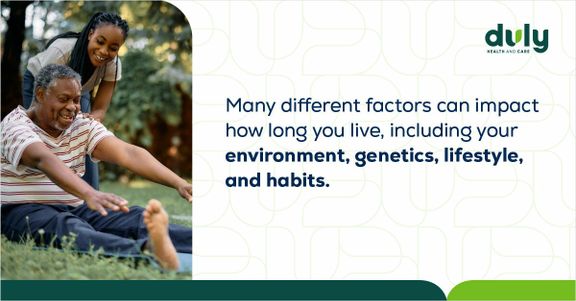When you make a New Year’s resolution, you may be thinking of ways you can improve your health over the year. When you decide to try a new kind of physical activity, you might focus on how to get better over a couple of weeks or months.
But when you are thinking about what healthy habits to add to your routine, you may not think about how they can help you live longer — and you may be surprised at how easy some of these habits are.
Here are 8 healthy choices that can add years to your life.

1. Get more movement in your day.
Physical activity is a key part of staying healthy — and it can also help you live longer. In fact, studies have found that just 21.43 minutes of movement each day can lower your chances of dying from all causes by 33%.
If 22 minutes sounds like a lot, remember there are many different ways to move each day that don’t involve “exercise.” Taking the stairs, getting more steps in your day by cleaning your house, and playing with your kids or pets are all ways to get moving.
2. See your primary care physician every year.
Regularly seeing your primary care physician (PCP) can play a significant role in extending your lifespan. Research has shown that people who prioritize annual visits with their PCP reduce their risk of premature death by 19% compared to those who only rely on specialist care.
Your PCP is a great resource for preventative care, health screenings, and early detection of potential health issues. By building a long-term relationship with your PCP, they can monitor your overall health and provide personalized guidance on healthy lifestyle choices.
Make your annual wellness visit a priority by finding a Primary Care Provider or making an appointment with yours today.
3. Quit smoking.
Quitting smoking is a choice that can improve your health as well as lengthen your life. Smoking is associated with an increased risk of heart disease, lung cancer, COPD, and stroke — all of which can have an impact on the length or quality of your life.
When you quit smoking, there is an immediate benefit by not putting harmful chemicals and toxins from cigarettes into your body. Long-term studies have shown that smokers who quit can add up to 10 years onto their life.
4. Eat less red meat.
It’s okay to enjoy a nice steak dinner every now and then, but eating less red meat may help you live longer. Reducing how much red meat you eat (especially processed varieties) has been linked to lower mortality rates. Other options — like seafood, poultry, beans, nuts, seeds, eggs, and soy products — can be a great source of protein instead.
It’s also a good idea to add more fruits and vegetables while you’re at it. Just 2 servings of fruit and 3 servings of veggies every day can lower your risk of dying from a chronic disease.
5. Wear your seatbelt.
Wearing a seatbelt when in a car is a simple yet important habit that can increase your chances of living a longer life. In the state of Illinois, it is not just a good practice but also a legal requirement.
Your seatbelt can prevent a serious injury or death if you get in a car accident. In 2017, 14,955 lives were saved because someone was wearing their seatbelt — and it’s estimated that seatbelt usage could have saved more than 2,500 more if people had buckled up.
6. Get more sleep.
One bad night’s sleep can leave you tired and grouchy. But a lifetime of bad sleep can have serious health impacts. Studies have shown that people who consistently sleep the recommended amount — typically between 7 to 8 hours per night — tend to live longer.
But it’s not just about getting enough sleep, it’s also about getting good sleep. Quality sleep includes the number of hours each night, but it also means falling asleep quickly, staying asleep throughout the night, and waking up feeling rested (without the use of sleep medications). All of these together can literally add years to your life.
7. Put home safety first.
Home safety can be a big component of living a longer life, especially as you get older. Accidental falls are the leading cause of injury-related deaths among older adults, making it crucial to create a safe living environment.
Simple changes like installing grab bars and handrails, getting rid of tripping hazards, and making sure there is good lighting, can significantly reduce the risk of a fall. By prioritizing home safety, you can lower the risk of a fall for yourself or a loved one — maybe even saving and extending someone’s life.
8. Stay connected.
Maintaining relationships and avoiding isolation can extend your life. Research has shown that social isolation and loneliness have a negative effect on your health and increase the risk of premature death. People who experience isolation may have as much as 32% higher risk of early death compared to those who are not socially isolated.
Engaging in social activities, creating meaningful relationships, and staying connected with friends, family, and your community can have a positive impact as you age. When you have strong relationships, you may experience a longer and more fulfilling life.
By building healthy habits, you aren’t just improving your health in the moment, but in the long term too. Small changes can make a big difference — helping you live a long, full life.
Health Topics:








